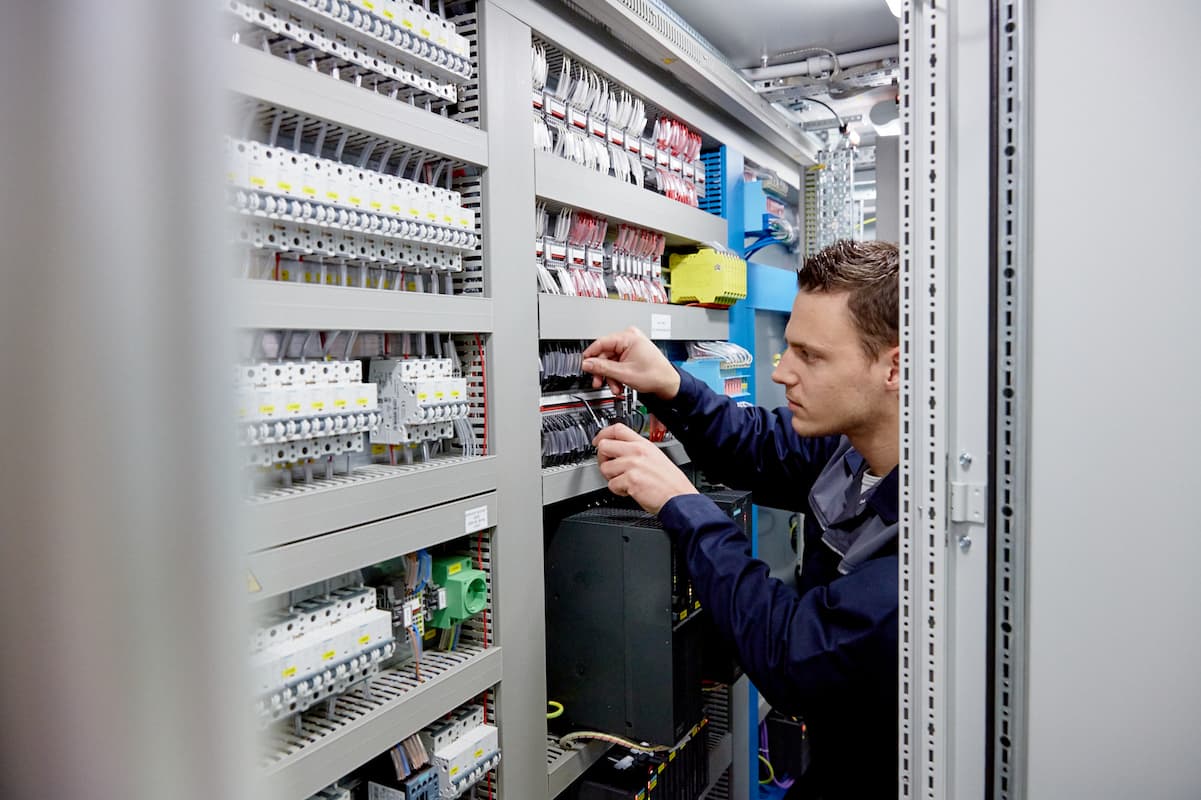An industrial electrician is an electrical whiz with a knack for navigating complex electrical circuits used in major industries. They are commonly responsible for installing and setting up electrical systems and equipment, such as in motors, generators, transformers, and control systems. They read and interpret technical diagrams and blueprints to determine the best placement and configuration of electrical equipment and wiring.
An industrial electrician must also perform routine maintenance on electrical equipment to ensure it operates efficiently and safely. This includes cleaning and replacing parts, repairing faulty wiring, and testing electrical systems to identify and address potential problems before they become serious.
They need to apply their knowledge of electrical systems to diagnose and troubleshoot problems with equipment and systems. They may use testing equipment such as voltmeters, oscilloscopes, and other tools to determine the cause of electrical malfunctions. When electrical equipment and systems fail, an industrial electrician restores them to working order. This may involve replacing faulty components, rewiring systems, or upgrading equipment to improve performance.
An industrial electrician maintains accurate records of electrical installations, repairs, and maintenance. They document their work in logs and reports and ensure that all work is performed in accordance with company and industry standards.
An industrial electrician must follow strict safety protocols to ensure that electrical equipment and systems are installed, maintained, and repaired safely. This includes adhering to codes and regulations, wearing protective gear, and taking steps to prevent electrical shocks, fires, and other hazards.
To excel in this position, industrial electricians must be outstanding problem-solvers, with exceptional communication skills. Industrial electricians often work alongside electrical engineers and contractors, as well as technicians and team members. Furthermore, this role is for people who can focus well and love working with their hands to operate a diverse set of tools and equipment.
Industrial electricians are needed in a range of sectors. They can specialize in industries like construction, where they are commonly referred to as construction electricians and install electricity and electrical equipment in infrastructures. They can also find opportunities in industries such as manufacturing, mining, ship and boat building, maintenance, aerospace, energy, and automotive. The demand for industrial electricians will remain as electricity continues to dominate power supply, only increasing for instance in the automotive sector given the rise of electrical vehicles.
Apply now for a job as Industrial electrician!
Industrial Electrician
Location: Warwick
Branche: Life Sciences
Expertise: Production & Manufacturing
Experience: 2 years
About the role: This permanent, full-time position involves working alongside our maintenance electricians to carry out both preventative and reactive maintenance across the entire facility. The role requires early starts at 5am and a five-day work week, scheduled across seven days, with a minimum of 38 hours per week. All staff must follow strict biosecurity measures. This means employees cannot keep birds, poultry, or pigs at home, and you'll be required to shower in and out of the facility each day. All tools, equipment, and uniforms are supplied.
Industrial Engineer (w/m/d)
Location: Stuttgart
Branche: Machine & Plant Design
Expertise: Production & Manufacturing
Experience: 2 years
Entwicklung und Planung des Layouts für einen neuen Standort zur Montage unter Berücksichtigung von Produktionsanforderungen, Logistik und zukünftiger Skalierbarkeit Optimierung der Produktionsfläche hinsichtlich Effizienz, ergonomischem Arbeitsfluss, Materialtransportwegen und Einhaltung von Sicherheits- und Arbeitsschutzvorschriften Koordination und enge Zusammenarbeit mit interdisziplinären Teams, einschließlich Produktion, Logistik, Qualitätssicherung und Engineering, zur Sicherstellung technischer Anforderungen und Produktionsziele Durchführung von Prozessanalysen bestehender Abläufe zur Identifikation von Verbesserungspotenzialen und Ableitung geeigneter Maßnahmen zur Effizienzsteigerung Entwicklung von Layout- und Flächenkonzepten mithilfe gängiger Planungstools und Präsentation der Ergebnisse gegenüber internen Stakeholdern Begleitung der Umsetzung vor Ort sowie Überwachung der Einhaltung von Zeitplänen und Budget
Industrial Engineer - Fertigungssteuerung (m/w/d)
Location: Bremen
Branche: Machine & Plant Design
Expertise: Production & Manufacturing
Experience: 2 years
Sie stellen eine termingerechte und vollständige Materialbereitstellung für Fertigungsaufträge sicher. Fehlerhaftes Material wird von Ihnen gesteuert, bewertet und zielgerichtet zur Nacharbeit oder Reklamation weitergeleitet. Die Überprüfung der Kostenabrechnung von Fertigungsaufträgen von Plan- zu Ist-Kosten gehört ebenso zu Ihrem Aufgabenbereich wie die Analyse und Identifikation von Abweichungsursachen. Technische Änderungen und Reparaturen wickeln Sie eigenständig durch das Anlegen von Nacharbeitsaufträgen sowie die fachbereichsübergreifende Koordination ab. Sie definieren und steuern die Ablaufplanung für Nacharbeiten sowie für Prototypenaufträge. Gestörte Fertigungsaufträge werden von Ihnen aktiv analysiert, koordiniert und zielgerichtet gemanagt. Rückstände und Überlasten bereiten Sie transparent auf und leiten geeignete Maßnahmen zur Abarbeitung ein. Die Beauftragung sowie das Expediting der verlängerten Werkbank liegen in Ihrer Verantwortung.
Industrial Engineer - Fertigungsvorbereiter (w/m/d)
Location: Cuxhaven
Branche: Renewable Energy
Expertise: Production & Manufacturing
Experience: 2 years
Analyse und Optimierung von Fertigungsprozessen: Sie analysieren bestehende Arbeitssysteme und gestalten diese effizient und zukunftsorientiert weiter. Gestaltung ergonomischer Arbeitssysteme: Sie berücksichtigen technische, ergonomische und wirtschaftliche Aspekte bei der Planung von Fertigungsabläufen. Sicherstellung von Qualitätsstandards: Sie gewährleisten die Einhaltung definierter Qualitätsvorgaben im gesamten Produktionsprozess. Umsetzung von Effizienzsteigerungen: Sie identifizieren Verbesserungspotenziale und setzen gezielte Maßnahmen zur Steigerung der Produktivität um. Kontinuierliche Prozessverbesserung: Sie treiben systematisch die Weiterentwicklung von Fertigungsprozessen im Produktionsumfeld voran. Schnittstellenübergreifende Zusammenarbeit: Sie arbeiten eng mit angrenzenden Abteilungen zusammen, um reibungslose Abläufe sicherzustellen.
Electrician
Location: Leyburn
Branche: Life Sciences
Expertise: Production & Manufacturing
Experience: 1 years
About the role Install, commission, maintain, and repair electrical control systems and industrial electrical equipment Carry out fault finding, testing, and diagnosis of electrical systems and malfunctions Deliver commercial and industrial electrical installations, upgrades, and project work across all sites Perform both planned and reactive maintenance in line with operational requirements Assemble and install electrical and electronic components and equipment Read and interpret electrical, control, and instrumentation schematics and drawings Participate in a rotating on-call roster (one weekend every four weeks)
Common industrial electrician responsibilities
- Inspecting electrical components in equipment, machines, systems and building to identify any issues;
- Repairing faulty equipment and damaged electrical components;
- Developing and implementing preventative procedures to manage electrical systems and guarantee functionality;
- Planning and scheduling repairs as needed;
- Conducting periodic quality checks on electrical equipment and systems to ensure everything is up to standard;
- Performing general routine maintenance tasks like repairing electrical circuitry in a building;
- Helping develop and implement the budget for the electrical maintenance activities;
- Maintaining the inventory records for electrical equipment and supplies;
- Collaborating with electrical engineers, contractors, or other technical specialists to resolve problems;
- Delivering electrical service outputs in compliance with relevant requirements, codes, and certifications, and in line with customer needs and demands;
- Participating in trainings as needed;
- Assuring the safety and security of oneself and team members.
Qualifications for industrial electricians
Industrial electricians should have at least a high school diploma and a technical or trade certification as an electrician. A Bachelor’s degree in Electrical Engineering or similar field is advantageous, particularly if one’s desire is to pursue a career as an electrical engineer.
Additional supporting skills and experience include:
- 2+ years’ experience in a similar electrician role;
- Strong foundation in mathematics, science, and technical subjects;
- In-depth knowledge of electricity and electrical systems;
- Solid understanding of electrical maintenance procedures and techniques;
- Able to read technical diagrams and blueprints;
- Possess good hand-eye coordination;
- Using problem-solving abilities effectively;
- Having excellent written and verbal communication skills;
- Being well-organized and having the ability to prioritize tasks.




